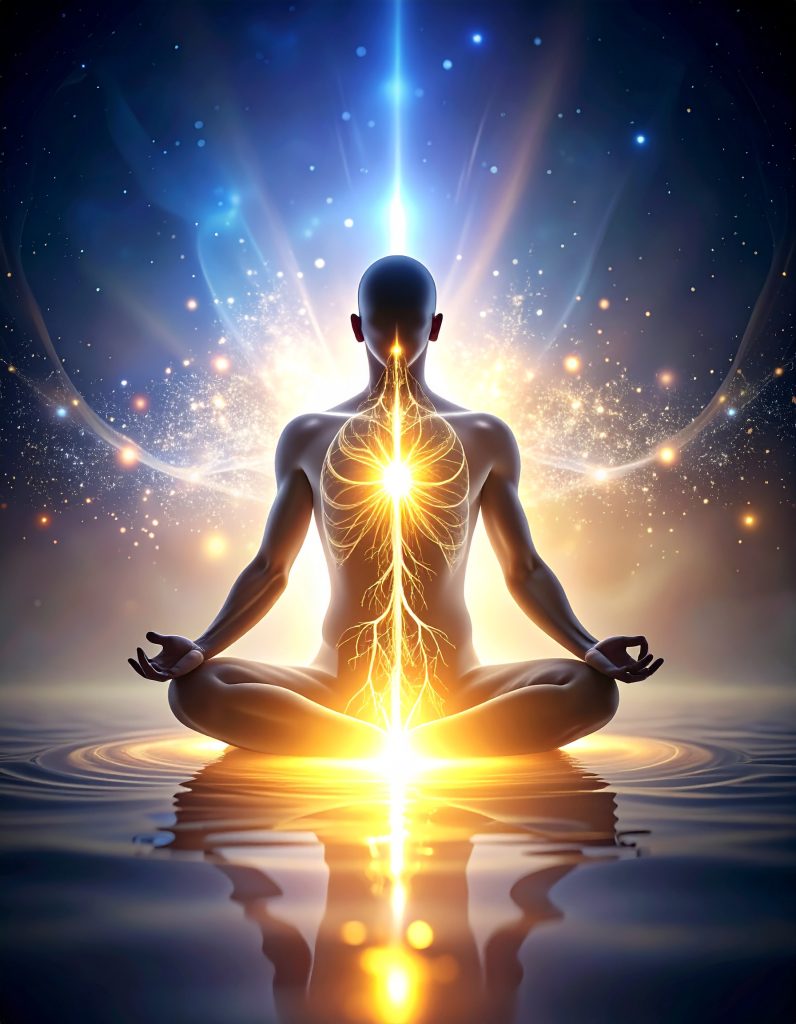
In a quiet valley, a river had reached the edge of the world she knew. Before her stretched the vast ocean — shimmering, endless, and terrifying. The river stopped at the shore, looking back at the journey behind her: the snowy peaks where she was born, the forests she carved through, the villages she nourished. But now she stood still, paralysed by fear.
“If I go forward,” she thought, “I will disappear forever. I will lose myself.” She cried out to the wind. “I am not ready to become the ocean. I am just a river.”
The wind replied gently, “You have always been the ocean — in motion.” Still, the river hesitated.
Along came an old man walking on the beach. He noticed her shimmering unease. “Why do you tremble?” he asked.
“Because I am afraid,” said the river. “I’ve only ever known how to be a river. The ocean seems… too vast. I don’t know what I’ll become.”
The man smiled knowingly. “You think you will disappear into something greater. But what you don’t see is — the river and the ocean are not separate. The river does not lose herself. She remembers herself as part of something more.”
The river was quiet.
“Your essence,” the man continued, “was never the banks that held you or the paths you followed. Your essence was always the water, the flow, the light that danced upon you. You are Spirit now — not later.”
The river breathed deeply. She let go of her fear. With a final shimmer under the sun, she flowed forward. She met the ocean’s waves and, to her surprise, she did not vanish. She expanded. She felt herself ripple across the horizon, mingle with tides she never knew, touch distant shores she’d never dreamed of.
She was river.
She was ocean.
She was rain.
She was everything she’d always been — only freer.
And from somewhere deep within, she heard her own voice: “I am Spirit now.”
On the beach, the old man closed his eyes, feeling her waves kiss his feet. He whispered, “Yes. You are.”
audio version:
Service Reflection
“You are Spirit now — a divine being living a human experience. Spiritualism invites us to awaken to this truth, take responsibility for our journey, and live with love, humility, and curiosity.”
The sermon emphasises:
- The trinity of body, soul, and spirit.
- The eternal nature of Spirit within each of us.
- Personal responsibility for our own spiritual progress.
- Love as the essence that transcends death and connects us with others, here and in the Spirit world.
- Spiritualism as a path of experience, not blind faith — seeking truth within ourselves.
The trinity of body, soul, and spirit
The sermon beautifully explains that we are more than just a physical body.
- The body is described as our temporary home — the sacred temple that allows us to move, feel, and experience life on Earth.
- The soul is the keeper of our stories, emotions, lessons, and love; it holds our Akash — the record of our growth and becoming.
- The spirit is the eternal spark of divinity within us, the breath of the Creator that animates all life.
Together, these three — body, soul, and spirit — form the true essence of who we are: a divine being in a human experience. This trinity reminds us to honour all aspects of ourselves — to care for the body, listen to the soul, and awaken to the light of the spirit.
Note: The name Akash, also spelled Aakash, has its roots in Sanskrit and generally means “sky” or “open space”.
It can also be interpreted as “ether” and symbolizes vastness, openness, and limitless potential.
The eternal nature of Spirit within each of us
We are not waiting to “become” Spirit after we die — we are Spirit now.
This is a key truth the sermon invites us to realise. The Spirit within us is unbounded, limitless, and eternal. When the body falls away at death, it is only the physical form that ends. The Spirit continues, carrying our character, our kindness, even our struggles.
Those we love who have crossed into Spirit are still with us — walking beside us, whispering in dreams, sending signs through memories, scents, or music.
This eternal nature of Spirit assures us that love and connection do not end; they transcend physical death.
Personal responsibility for our own spiritual progress
The sermon emphasises that no one else can save us — not even Jesus came to “save” us, but to show us the way.
We are each responsible for our own growth and awakening. Our actions, our choices, our willingness to love and serve — these determine the vibrations we carry and the experiences we attract, both here and in the Spirit world.
This idea aligns with the sixth principle of Spiritualism: personal responsibility. We are not condemned for our mistakes, but we must awaken, learn, and choose to evolve. We cannot place our sins on another or expect to be saved by someone else — we walk our own path of becoming.
Love as the essence that transcends death and connects us with others, here and in the Spirit world
Today’s sermon tenderly reminds us that love does not die — it is stronger than death.
Love is what binds us to our loved ones in Spirit, just as it binds us to those here on Earth. Even when grief or disbelief clouds our senses, love continues to flow, reaching across the so-called veil.
The Spirit world is not a distant heaven but is woven into this life, close enough to touch — if we are willing to listen and feel.
Mediumship becomes possible because of this ongoing connection of love. It is through love that we rise, through love that we heal, and through love that we experience “heaven” — which is not a place but a state of being.
Spiritualism as a path of experience, not blind faith — seeking truth within ourselves
Finally, the sermon reminds us that Spiritualism is not about dogma or blind belief. It is a way of life that asks us to seek, to feel, and to experience truth directly.
We are not told what to think or believe — we are invited to explore what resonates as true in our own being.
This path honour’s philosophy, science, and spirit, integrating knowledge with personal experience. Spiritualism encourages humility, compassion, curiosity, and an open heart — because the truth is already within us. We are not here to worship or to fear, but to live, to grow, and to awaken to the Spirit we already are.
audio version:
